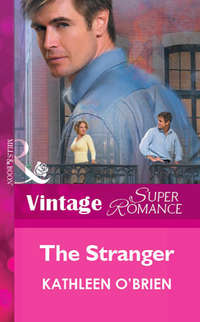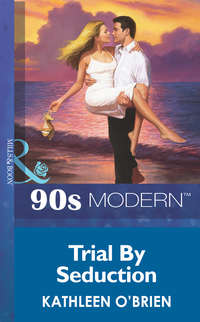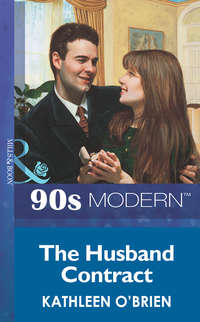
Полная версия
The Saint
All the faculty, right up to the principal, were here today. Even the school volunteers had showed up—like Linda. The Send-off was the highlight of the school year. Each May, just before the start of final exams, the junior class hosted a water party for the outgoing seniors. It had been a Heyday tradition for at least fifty years.
Heyday was big on tradition. Kieran’s father, who had, until his death less than two months ago, owned most of Heyday, had always said that tradition was what the little town had instead of culture, prominence, wealth or wisdom.
“So, I hear you’ve got another superstar coming along next season, Coach. You know the one.” Linda tilted her head. “What’s his name? Nice muscles. Bedroom eyes.”
“Bedroom eyes?” Kieran looked at her. “I have no idea who you’re talking about, but you’d better watch it, Linda. These boys are underage.”
“Well, he does have sexy eyes.” She grinned from under the wide brim of her hat. “I can’t help noticing, can I? Oh, what is his name? The boy everyone is saying could be the new Steve Strickland. Eddie-something.”
“Eddie Mackey?” Kieran wondered where Linda had heard about Eddie. “He’s good, but he’s not on the team yet. He’s not sure he wants to play.”
“Oh, you can talk him into it. You can talk anybody into anything. Steve Strickland didn’t want to play at first, either, and look how good he turned out to be.”
Kieran tossed his empty Gatorade bottle into the recycling bin. “Of course Steve wanted to play,” he said. He hoped he didn’t sound defensive. “Where did you hear that he didn’t want to play?”
“I don’t remember…” Linda chewed on her lower lip. “Oh, that’s right. It was his sister who didn’t want him to play. That’s what I heard. They say Claire hated the idea of Steve playing football. I never understood why. Was she afraid he’d get hurt or something?”
That was stupid, even for Linda. Instantly, she realized her mistake and drew in a deep breath. “I mean—you know. In a game. Like getting tackled or something. Naturally, no one could have imagined he’d end up—”
“No.” Kieran popped open another drink and downed half of it in one gulp. It really was hot out here. “No one could have imagined that.”
“Where is she now, do you know?”
Kieran squinted into the sunlight, trying to see if the people barbecuing hot dogs needed any help. “Who?”
“Claire. Do you know if she’s still in Richmond?”
“No.”
Linda flicked him with her napkin. “Be specific,” she said. “Do you mean no, she’s not in Richmond, or no, you don’t know?”
“No, I don’t know.”
“You haven’t seen her since—”
“No.”
“Do you think she’s still angry? Do you think she still blames you for—”
“I don’t know.”
“I’ll bet she doesn’t.” Linda unbuttoned her top two buttons, exposing as much cleavage as possible, and began fanning herself again. “I mean, how could she? It didn’t make any sense to start with. I mean, you didn’t force the kid to drive seventy miles an hour down Poplar Hill, did you?”
“No, I didn’t.”
According to Claire, though, that was just a cop-out. He had put too much pressure on the players, she’d said, her voice filled with tears and fury. He had expected them to do the impossible, and, because they had loved him, they’d tried to deliver.
At least that’s what she told him the night she called and asked him not to come to the funeral.
“See? You didn’t have a thing to do with it. Claire Strickland just went a little crazy, that’s all. She wasn’t thinking straight, and she needed someone to blame.”
Kieran did not want to have this conversation. Especially not with Linda Tremel, who didn’t have an ounce of imagination. She could never understand how, when Kieran had held Claire in his arms and told her Steve was dead, it had been like holding a ghost. She had seemed completely empty, as insubstantial as smoke. He had thought, for a minute, that she might just float away forever.
He scanned the crowd, desperately seeking a savior. But being with Linda Tremel was like acquiring leprosy—even your best friends wouldn’t venture near enough to save you.
Finally he caught Principal Winston Vogler’s eye. The elderly man was too softhearted to resist a plea for help. Kieran felt a little guilty as Winston came over, smiling politely at Linda. But only a little.
“Hey there, Ms. Tremel. Howdy, Coach.” Principal Vogler patted Kieran on the back and gave Linda a kiss on the cheek. “It’s a terrific day for the Send-off, don’t you think? The weather always cooperates with Heyday High.”
Linda opened another button. Winston was almost seventy years old—he’d been a contemporary of Kieran’s father—but he was a male, and that apparently was Linda’s only requirement.
“Well,” she drawled, borrowing Kieran’s Gatorade and rubbing its cool plastic sides against her collarbone, “it’s pretty hot.”
Kieran couldn’t help cringing for her. She hadn’t been like this before Austin Tremel divorced her last year. Back when she had first landed Austin, the rich boy from the right side of the tracks who was supposed to make all her dreams come true, she had spent every moment trying to be worthy of him. Trying to remake herself into the perfect lawyer’s wife.
It must have hurt pretty bad when he dumped her. She’d spent the past year trying to prove to herself that she was desirable. Austin had a new lover—had probably acquired her long before the divorce—so Linda obviously wasn’t going to be happy until she had one, as well. Or two, or three. However many it took to show Austin she didn’t miss him.
Winston was watching the three-legged zebra race, which involved bags painted with black and white stripes. “Do you think,” he asked suddenly, “that any of these kids even know why they’re called the Fighting Zebras at Heyday High?”
“Heck, no,” Linda said.
Kieran knew that was probably true. Many of Heyday’s younger citizens had no idea that the city got its name because a trainer for a little nomadic circus got drunk one night and left the animal cages unlocked.
They didn’t know about the zebras, which, once having escaped, had eluded capture for days, then weeks…and then forever. Long after the monkeys and the lion had been recovered, long after the circus owner had decided to cut his losses and move on, the clever zebras remained at large.
For months, people reported sightings of zebras galloping in the woods, zebras strolling in the park, zebras grazing along the highway. But the two animals danced in and out, taunting their would-be captors, and eventually the fairy tale of freedom caught the public eye.
Newspapers as far away as D.C. wrote stories. “Zebras Have a Heyday,” the first story proclaimed. And the little town of Moresville, tired of being “Boresville,” saw its chance to reinvent itself. On the Fourth of July, nineteen hundred and three, the mayor had gleefully knocked down his gavel on a five-to-one vote, and Heyday was born.
Every Fourth of July since, the city had sponsored its Ringmaster Parade. Most people didn’t ask why. They merely accepted that the city would elect a Ringmaster and Ringmistress, just as they accepted that the Big Top Diner had a roof like a circus tent, and that the bartenders at the Black and White Lounge wore striped tuxedos topped with zebra ears on a headband and springs.
“So.” Winston shifted from one foot to the other and was apparently having trouble deciding where to look. Linda Tremel’s rather large chest seemed to take up too much of his field of vision. “So, Kieran, what time do you head for Richmond in the morning?”
Oh, hell.
Kieran could feel the curiosity emanating from Linda. But what could he do? If he told the truth, that he was going to spend the weekend in Richmond, she’d be giddy with speculation. If he evaded or lied, it would look suspicious.
And it wasn’t suspicious. That he should be heading for a conference in the city where Claire Strickland now lived was a minor coincidence, yes. But Richmond was a big city. Probably two thousand people went there every day without running into Claire Strickland, either deliberately or accidentally. He’d just be number two thousand and one.
“Actually, I’m leaving tonight,” he said as blandly as possible. “The conference starts early in the morning.”
“You’re going to Richmond?” Linda had begun to smile. “Richmond?”
“Yes,” he said. “I’m speaking at a coaching conference. I’ll just be there overnight.”
“Are you planning to—”
“No.”
She chuckled. “You don’t even know what I was going to ask.”
“Yes, I do. And the answer is no. It’s purely a working trip. I won’t be making any social calls while I’m in town.”
Winston looked confused. “But you’ll have the evening free, Kieran,” he said. “You know that time’s your own to do whatever you want. Social calls are fine.”
Kieran laughed. This was becoming the conversational equivalent of gum on your shoe. “Linda’s joking, Win. I don’t want to make any social calls.”
Linda grinned. “Yes, but if you do—”
“I won’t.”
“Okay, fine. But if you do.” She winked at him. “Give her a kiss for me. Anything beyond a kiss, well, then you’re on your—”
Kieran groaned and turned away, which meant he was in the perfect position to glimpse the incoming missile just in the nick of time.
He called out the standard warning. “Heads up!”
Winston, who was seasoned in the ways of mischievous high-school boys, sidestepped instantly. Unfortunately, Linda, who wasn’t, stood there looking confused.
“What—?” She frowned.
A pop, a splat, a splash. And suddenly her lacy white cover-up was splattered from neck to knee with sticky orange liquid. She looked down, horrified.
Somehow Kieran managed not to laugh. He didn’t even smile. He actually tried to feel sympathetic. He didn’t allow himself to believe it had been fate, intervening to spare him any more of Linda’s lip-licking curiosity.
But it had been a lucky shot, hadn’t it?
Principal Vogler, on the other hand, was furious. A courtly man himself, he obviously found pegging a woman with a water balloon to be an outrage. He reached out and snagged the nearest teenage boy, a kid with dark hair and deep blue eyes. “Bedroom” eyes, in fact.
“Come here, young man,” Winston bellowed.
He didn’t wait for the poor kid to say a word. He dragged him by the collar and forced him to face Linda.
“Ms. Tremel, this is Mr. Eddie Mackey. I believe he has something he’d like to say to you.”
THERE MUST BE A LINE from Hamlet for a moment like this. Claire studied her sedate navy-and-white spectator pumps and considered the issue. How about the one that said a person could “smile and smile and be a villain?”
It seemed apt enough. Mrs. Gillian Straine, the principal of the Haversham Girls’ Academy, never stopped smiling. It was how she wooed the best parents, the best girls, the best alums, the best college recruiters. But after almost two years teaching seventh grade here at HGA, Claire had learned how sharp the steel was that lay behind that smile.
Today the metal was in full, lethal force as Mrs. Straine sat at her huge mahogany desk, in her magnificent wood-paneled office, and read a letter of complaint that had just arrived. The letter stated that Miss Claire Strickland was teaching the girls from texts of questionable morality.
The letter was apparently very long—or else Mrs. Straine was a very slow reader. Claire adjusted her modest navy skirt and tried not to be nervous. But Mrs. Straine’s smile was so tight right now her lips had almost disappeared. Not a good sign.
Maybe the better quote was “To be or not to be.” To be or not to be fired.
Finally Mrs. Straine looked up. “This is very troubling,” she said softly. She said everything softly. It forced other people to be perfectly quiet, and to lean in slightly, in a deferential pose, in order to catch her words.
“Is it true, Miss Strickland? You have unilaterally decided to teach Hamlet to your seventh graders?”
“Not the entire play,” Claire said. “Just some of the famous speeches. It’s part of a larger unit on Shakespeare.”
Mrs. Straine took off her reading glasses and tapped them against the letter. “It says here you’ve been telling the children there are such things as ghosts. It says you’ve told them about fratricide and suicide.” She shook her head. “They even accuse you of using the I word.”
Claire frowned. The I word? What on earth was the I word? Insanity? Iago? No, that was Othello.
Iambic pentameter?
Mrs. Straine closed her eyes, apparently grieved that Claire was forcing her to utter it.
“Incest,” she whispered.
Oh, for heaven’s sake.
“I didn’t call it incest,” Claire said. “Shakespeare did. Or rather Hamlet did. It’s just a small part of the overall story. You see, Hamlet’s mother marries his uncle—”
“I know what happens in Hamlet, Miss Strickland.”
Claire leaned back in her chair. “Of course you do. I’m sorry.” She’d swallowed her pride in this job so often she’d almost gotten used to the bitter taste. “Then of course you know it isn’t incest with the same connotations we might have today.”
“I don’t believe any of that word’s connotations are socially acceptable,” Mrs. Straine said. She was sitting up so straight her back wasn’t touching the chair. “I honestly would have thought you understood that vocabulary like that has no place in an HGA classroom.”
Claire tried one more time. “But this is Hamlet, Mrs. Straine. This is Shakespeare. Hamlet is taught in classrooms all over the world every day, and—”
Mrs. Straine waved her hand. “We do not judge ourselves by everyone else, Miss Strickland,” she said. “At HGA, the standards are far higher.”
Higher than Shakespeare?
“I’m afraid we must insist that our teachers meet those standards. Every teacher, every day.”
So was this it? Was this where Claire would be told to take her copy of Hamlet and go home? She realized suddenly that she didn’t care very much. Since Steve died, she hadn’t cared about much of anything. But she tried to look earnestly concerned. She did have to earn a living, and HGA at least had the virtue of paying well and recruiting bright, well-behaved students.
“However,” Mrs. Straine went on, “I don’t think we need to overreact. Overall, your performance since coming to HGA has been exemplary. I think it will be adequate merely to place you on probation.”
“Probation?”
Mrs. Straine folded up the letter and placed it in a file marked Strickland, Claire. “Yes. It should not be construed as punitive. It’s merely precautionary. I’ll be keeping a close eye on your work. I’ll need to see your lesson plans daily, of course. After six months, we’ll review the matter and see where we stand.”
Claire understood she’d been dismissed. She stood and nodded—though she drew the line at thanking Mrs. Straine for her tolerance. She looked at the other woman—at her high, tight, extremely sophisticated French braid, her severe Armani suit, her Tiffany-set diamond wedding ring—and she wondered whether there really was no Mr. Straine, as the other teachers sometimes suggested.
It was possible. Claire’s own mother had pretended she was a “Mrs.,” and she undoubtedly wasn’t the only woman who did. Mrs. Straine’s reasons would be different, of course. She wouldn’t be trying to protect her two illegitimate children. But whatever the reason, living a lie took its toll.
As she left the school, Claire thought how much nicer it would be if she could go home and tell Steve about all this. What fun they’d have parodying Mrs. Straine’s Victorian syntax and ridiculous whisper. If Steve were there, this would seem hilarious in no time. They’d laugh away any sting, and then they’d sit around and think up absurd new meanings for the school’s initials. She could almost hear him now. Humongous Growling Amazons. Hippos Gathering Acorns. Hot Greasy Aardvarks.
But Steve wasn’t there, of course. Her half-furnished apartment would be empty when she finally got home later tonight. She had a meeting after school, which she would go through like a robot. Then she’d stop by the grocery store, and then drive to the apartment.
When she got in, she’d ignore the five or six messages on her machine—it was easier to ignore an invitation than to turn it down, and the result was the same in the end. She’d read a little. And then, as soon as she possibly could, she’d go to sleep.
To sleep. Perchance to dream. Yes, Hamlet knew where the real dangers lay. Claire still dreamed about Steve at least once a week. They were cruel dreams—the kind that woke you up with your heart in your throat. In the dreams, she always drove down Poplar Hill one second too late. Steve always died in her arms while Kieran McClintock stood over them and smiled.
But that night her meeting ran long and it was after ten before she got home. All in all, it had been an exhausting day. Maybe she’d be too tired to dream.
She pulled into the complex parking lot, gathered her books and papers and purse and groceries and made her way to her second-floor apartment.
And, there, on her elegantly lit landing, she came face-to-face with a man she had thought she’d never see again.
The smiling man of her terrible dreams.
CHAPTER THREE
KIERAN WAS SHOCKED by how different Claire looked. How much older.
He hadn’t seen her in two years, but still…
Part of it was her hair. She had beautiful hair, a deep, shiny brown. She used to wear it almost to her waist. When she taught, she just whisked it up into a casual twist that always had adorable bits and pieces escaping from it. Now it was cut in a sleek, chin-length bob that fit like a helmet.
And her outfit. It was the pencil-thin uniform of a corporate lady-shark. What had happened to the flowing cotton jumpers and soft pastel T-shirts?
But most of all, it was her face. Even in the worst days of her first grief, she hadn’t looked this tight and closed-in. Her brown eyes, round, large and long-lashed, had always reminded him of some gentle woodland creature.
Not any more. Now she just looked tired and strangely distant. She didn’t even seem interested enough to be shocked to see him standing on her front porch.
“Kieran,” she said. “What are you doing here?”
That was a damn good question, actually. What the hell was he doing here? Back in his hotel room, he’d told himself a thousand times to quit being such a fool, put down his car keys, order room service, raid the minibar, turn on the television, anything. But none of it had stopped him.
“I’m in town for a conference.”
She shifted her packages so that she could see him better over the groceries, but she kept her fist tightly closed around her keys. She seemed to have no intention of opening that door.
“Not here in Richmond,” she said. “I meant here. What are you doing here?”
“I wanted to say hello.” Was that true? Actually, he had no clear idea why he had come. He’d just opened the telephone book, found her name and found himself getting a map from his laptop. “I wanted to see how you were doing.”
She shifted again, her keys clinking against a glass bottle, or maybe a can. “I’m doing fine.”
No, you’re not, he wanted to say. Any fool could tell she was lost. But he didn’t have the right to say anything like that. Hell, he didn’t even have the right to be standing here.
One date. That was all they’d ever had. One night when he’d sat across from her, eating salmon and salad and some stupid little bonbon dessert, and quietly going wild with wanting her.
One night—compared to Steve’s death, for which she had always blamed him. No, he’d say he had pretty damn few rights in this situation.
“I just—” He cleared his throat and began again. “I thought maybe we could talk for a while. Maybe I could take you out for coffee. I haven’t eaten dinner yet. I just got into town. Are you hungry?”
She looked at him with those shallow eyes. “We don’t really have anything to talk about, Kieran. We don’t have anything in common except Steve. And I don’t talk about Steve.”
You don’t? Oh, Claire…that’s not healthy. But of course he didn’t say that, either. He just looked at her sober face in the silvery light from the carriage lamp and wished he could go back two years and start over. God, the things he’d do differently!
“It’s been two years, Claire. Isn’t it time to let old—” But her face warned him to stop, so he did. “All right, then, how about if I promise we won’t talk about Steve?”
Her fingers must have clenched a little. The brown paper bag made a brief crinkling noise. “What topics would be left, then? Politics? The weather?”
“I could tell you about Heyday. It’s grown since you left. They’ve put in a new multiplex movie theater. Stadium seating. Four whole screens. The kids all want jobs there.” She wasn’t interested, but he kept going, determined to hit on something. “The bookstore expanded. And they put in a new traffic light.”
“Did they really. Where?”
Oh, hell. He hesitated just a second too long, as he recognized his mistake. She was smart. She knew what the hesitation meant.
“Where?”
He took a deep breath. “On Poplar Hill.”
“So much for that topic.” She turned away firmly. “I don’t mean to be rude, Kieran. I appreciate the effort you made to come. But I really think it’s better if we just say good-night.”
She fumbled with her key, trying to insert it into the lock.
“Claire.” He touched her shoulder, and she twitched away quickly. Too quickly. The oranges on the top of her grocery bag began to teeter. She shifted them, reaching out with her other hand to try to balance things, but at that very moment the door swung open, and she lurched forward.
Fruit and fresh vegetables spilled everywhere, and a box of spinach spaghetti hit the landing with enough force to split open. Thin green straws hopped and tumbled crazily, covering the concrete and bouncing down the stairs.
He caught the bag as it fell, just in time to save the sparkling water.
She knelt immediately and began scooping up bits of broccoli. “I’ll get it,” she said. “It’s okay. I’ve got it.”
He crouched beside her. “Let me help.”
For a minute he thought she was going to refuse. For a minute, she thought so, too. He could read it in her eyes. But obviously even she could see how impossibly rude that would be. She blinked, brushed her hair out of her eyes and nodded.
“Thanks,” she said. She dumped a handful of little green florets into the bag and began scooping up some more.
It took several minutes, but finally they had it all, down to the last strand of green spaghetti. She went in first. She left the door open behind her, so he assumed she wouldn’t call the police if he followed her in.
It was a beautiful apartment. Had she just recently moved in? The living room had high ceilings and an elegant coffee-colored molding; a brand-new, thick, champagne-beige carpet; and almost no furniture. One chair with a throw blanket across its arm, one small coffee table and a bookcase with a stereo on top—that was it. No sofa, no lamp, no stack of unopened mail on the foyer table. No tail-wagging puppy, no roommate, no—
No anything.
“It’s a nice place,” he said. “How long have you lived here?”
“A couple of years. Since I left Heyday.” She had gone straight to the kitchen. He heard the growling sound of the garbage disposal churning up broccoli—and discouraging any further conversation.
Two years? He stood in the doorway and looked around incredulously. She’d lived in this apartment for two years, and she had yet to hang a picture? She had never bought a television?
He moved through the big, hollow room and entered the kitchen. It looked a little more lived-in. The small breakfast bay had two chairs, and the table was covered in books and papers. He had heard she was still teaching. This must be where she created her lesson plans and did her grading.









